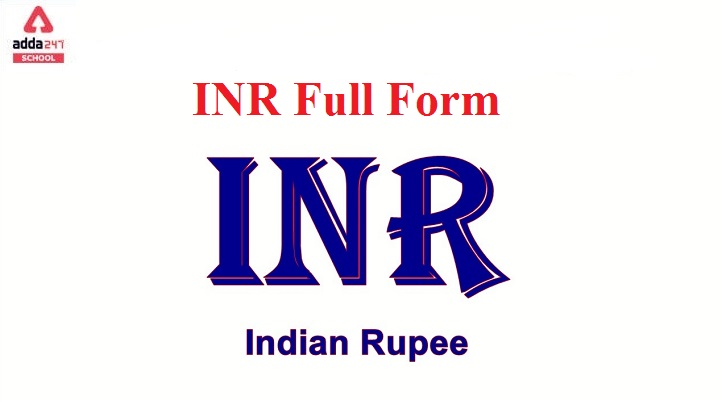INR Full form in Fees
INR Full Form: The full form of INR, the abbreviation, is Indian Rupee.
The Indian rupee is the country’s official currency. Previously, the rupee was divided into 100 paise. However, in 2019, 1 rupee coins are the smallest denomination in use.
The Indian government announced the demonetization of 500 and 1,000 rupee banknotes on November 8, 2016. It went into effect at midnight the following day, rendering these notes void. In addition to a new denomination of 2,000 banknotes, a freshly redesigned series of 500 banknotes went into circulation. New notes have been in circulation since November 10, 2016.
Since the 2016 demonetisation, the 1,000 note has been suspended. In addition, a new denomination of 200 banknotes was added to the Indian currency structure on August 25, 2017, to address the gap in notes. The Reserve Bank of India also introduced the revised series of 100 banknotes in July 2018.
The Reserve Bank of India is in charge of the currency’s issuance. The Reserve Bank of India administers currency in India and draws its authority from the Reserve Bank of India Act, 1934.
The Reserve Bank of India (RBI) issues rupee coins in various metals in values such as 50 paise, 1 rupee, 2 rupees, 5 rupees, and 10 rupees. King Ashoka is shown on the majority of these coins. The Reserve Bank of India printed banknotes in denominations of one, two, five, ten, twenty, fifty, one thousand, two hundred, five hundred, and two thousand rupees.
Except for the one rupee note, each of these denominations has Mahatma Gandhi’s picture on the reverse end. A rupee-coin is seen on the one rupee note.
D. Udaya Kumar developed a new rupee sign (₹) that was formally accepted in 2010. It was created by fusing the Devanagari consonant “र” (pronounced, ra) with the Latin capital letter “R.” The parallel lines at the top are considered to be a reference to the Indian tricolour flag. The parallel lines also depict an equality symbol, which represents the country’s commitment to narrow economic disparities. Prior to the introduction of the new rupee sign (₹), India used the symbols “Rs” and “Re” to represent multiple rupees and one rupee, respectively.
Read About: EMI Full Form
INR Full Form in medical: INR Test
The other full form for the abbreviation INR is International Normalized Ratio.
An INR (international normalised ratio) is a calculation based on PT test results that determine how long it takes for a blood clot to form.
The liver produces the protein prothrombin. Clotting factors are a group of chemicals that help blood clot. The clotting factors work together to produce a blood clot when a cut or other damage causes bleeding. Low clotting factor levels can cause you to bleed excessively after an accident. Too high levels might lead to deadly clots forming in your arteries or veins.
A PT/INR test determines if your blood clots normally. It also examines to determine if a blood clot-prevention drug is working properly.
Read About: CM Full Form
INR Full Form in Hindi
आईएनआर का पूर्ण रूप भारतीय रुपया है।
भारतीय रुपया देश की आधिकारिक मुद्रा है। पहले रुपये को 100 पैसे में बांटा गया था। हालाँकि, 2019 में, 1 रुपये के सिक्के उपयोग में सबसे छोटे मूल्यवर्ग के हैं।
भारतीय रिजर्व बैंक मुद्रा जारी करने का प्रभारी है। भारतीय रिजर्व बैंक भारत में मुद्रा का प्रशासन करता है और भारतीय रिजर्व बैंक अधिनियम, 1934 से अपना अधिकार प्राप्त करता है।
भारतीय रिजर्व बैंक (RBI) विभिन्न धातुओं में रुपये के सिक्के 50 पैसे, 1 रुपये, 2 रुपये, 5 रुपये और 10 रुपये जैसे मूल्यों में जारी करता है। इनमें से अधिकांश सिक्कों पर राजा अशोक को दर्शाया गया है। भारतीय रिज़र्व बैंक ने एक, दो, पाँच, दस, बीस, पचास, एक हज़ार, दो सौ, पाँच सौ और दो हज़ार रुपये के मूल्यवर्ग के बैंक नोट छापे।
एक रुपये के नोट को छोड़कर, इनमें से प्रत्येक मूल्यवर्ग में पिछले सिरे पर महात्मा गांधी की तस्वीर है। एक रुपये के नोट पर एक रुपये का सिक्का नजर आता है।
डी। उदय कुमार ने एक नया रुपया चिन्ह (₹) विकसित किया जिसे औपचारिक रूप से 2010 में स्वीकार किया गया था। इसे लैटिन कैपिटल अक्षर “आर” के साथ देवनागरी व्यंजन “र” (उच्चारण, आरए) को फ्यूज करके बनाया गया था। शीर्ष पर समानांतर रेखाओं को भारतीय तिरंगे झंडे का संदर्भ माना जाता है। समानांतर रेखाएं समानता के प्रतीक को भी दर्शाती हैं, जो आर्थिक विषमताओं को कम करने के लिए देश की प्रतिबद्धता का प्रतिनिधित्व करती है। रुपये के नए चिन्ह (₹) की शुरुआत से पहले, भारत ने क्रमशः कई रुपये और एक रुपये का प्रतिनिधित्व करने के लिए “रु” और “रे” प्रतीकों का इस्तेमाल किया।
Read About: PVC Full Form
INR Test Full Form
संक्षिप्त नाम INR का दूसरा पूर्ण रूप अंतर्राष्ट्रीय सामान्यीकृत अनुपात है।
एक INR (अंतर्राष्ट्रीय सामान्यीकृत अनुपात) पीटी परीक्षण के परिणामों के आधार पर एक गणना है जो यह निर्धारित करती है कि रक्त का थक्का बनने में कितना समय लगता है।
लीवर प्रोटीन प्रोथ्रोम्बिन का उत्पादन करता है। क्लॉटिंग कारक रसायनों का एक समूह है जो रक्त के थक्के में मदद करता है। क्लॉटिंग कारक रक्त के थक्के का उत्पादन करने के लिए मिलकर काम करते हैं जब एक कट या अन्य क्षति रक्तस्राव का कारण बनती है। कम क्लॉटिंग फैक्टर का स्तर दुर्घटना के बाद आपको अत्यधिक रक्तस्राव का कारण बन सकता है। बहुत अधिक स्तर से आपकी धमनियों या नसों में घातक थक्के बन सकते हैं।
एक पीटी/आईएनआर परीक्षण यह निर्धारित करता है कि आपके रक्त का थक्का सामान्य रूप से है या नहीं। यह यह निर्धारित करने के लिए भी जांच करता है कि रक्त का थक्का-रोकथाम दवा ठीक से काम कर रही है या नहीं।
| CBSE Full Form | ICSE Full Form |
| CEO Full Form | SOP Full Form |
| AM PM Full Form | ACP Full Form |
INR Full Form: FAQs
What is the definition of an INR level?
The outcome of a blood test to determine how long it takes for your blood to clot is known as the INR level. A PT, or prothrombin time test, is the name of this test.
What is a standard INR?
An INR of 1.1 or less is considered normal in healthy adults.
What does INR stand for in its entire form?
The entire form of the Indian rupee is INR.
Is it possible for a high INR to induce a stroke?
Ruptured aneurysms are linked to a high International Normalized Ratio.
Is INR 4.5 too much?
INR of 4.5–10.0 indicates a high risk of bleeding.









 CLAT Result 2026 Out, Download Scorecard...
CLAT Result 2026 Out, Download Scorecard...
 CLAT Topper List 2026 Released with Rank...
CLAT Topper List 2026 Released with Rank...
 When Will NEET 2026 Registration Start? ...
When Will NEET 2026 Registration Start? ...














